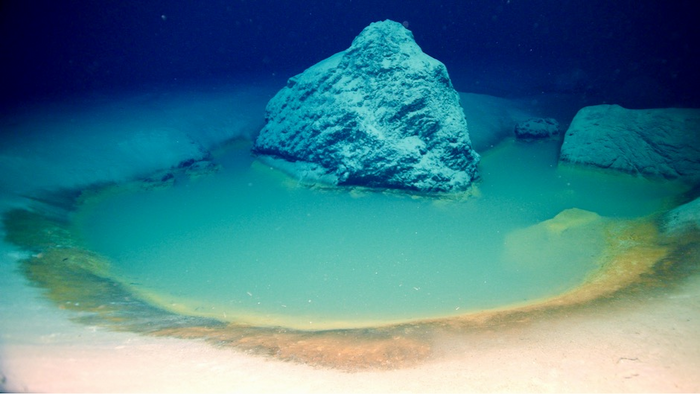MIAMI—Researchers at the University of Miami (UM) Rosenstiel School of Marine and Atmospheric Science recently discovered rare deep-sea brine pools in the Gulf of Aqaba, a northern extension to the Red Sea. These salty underwater lakes hold secrets into the way oceans on Earth formed millions of years ago, and offer clues to life on other planets.

Credit: NEOM
MIAMI—Researchers at the University of Miami (UM) Rosenstiel School of Marine and Atmospheric Science recently discovered rare deep-sea brine pools in the Gulf of Aqaba, a northern extension to the Red Sea. These salty underwater lakes hold secrets into the way oceans on Earth formed millions of years ago, and offer clues to life on other planets.
In partnership with OceanX, Sam Purkis, professor and chair of the UM Department of Marine Geosciences and team made their discovery more than one mile beneath the sea surface (1,770 meters) using a remotely operated underwater vehicle (ROV) on the OceanXplorer, a highly equipped research vessel capable of exploring the most unreachable places on Earth.
“Until we understand the limits of life on Earth, it will be difficult to determine if alien planets can host any living beings,” said Purkis. “Our discovery of a rich community of microbes that survive in extreme environments can help trace the limits of life on Earth and can be applied to the search for life elsewhere in our solar system and beyond.”
Brine pools are one of the most extreme environments on Earth, yet despite their high salinity, exotic chemistry, and complete lack of oxygen, these pools are teeming with life. Bioactive molecules with potential anticancer properties have previously been isolated from brine pool microbes in the Red Sea.
The research, published in Nature Communications, is the first discovery of brine pools in the Gulf of Aqaba.
“We were very lucky,” said Purkis. “The discovery came in the last five minutes of the ten-hour ROV dive that we could dedicate to this project.”
Located close to the coastline, these extremely salty, zero oxygen pools preserve information on tsunami, flashfloods, and earthquakes in the Gulf of Aqaba that took place thousands of years ago. There are many faults and fractures in the seabed associated with the tectonics of the region in this area of the Gulf of Aqaba.
Earlier this year, Purkis and team discovered evidence of a 500-year-old submarine landslide that likely spawned a sizable tsunami in the region, that could have implications for coastline development in Egypt and Saudi Arabia.
The study, titled “Discovery of the deep-sea NEOM Brine Pools in the Gulf of Aqaba, Red Sea,” was published July 27 in the journal Nature Communications Earth & Environment. The study’s authors include: Sam J. Purkis, Hannah Shernisky, Peter K. Swart, Arash Sharifi, Amanda Oehlert, Gaëlle Duchâtellier, James Klaus, Gregor P. Eberli, Larry Peterson and Graham Kolodziej from the UM Rosenstiel School; Fabio Marchese and Francesca Benzoni from King Abdullah University of Science and Technology’s Red Sea Research Center; Giovanni Chimienti from University of Bari Aldo Moro in Italy; Andrew Craig and Mattie Rodrigue from OceanX; Jürgen Titschack from MARUM – Center for Marine Environmental Sciences in Germany and Ameer Abdulla from NOEM.
The four-week OceanXplorer research voyage was funded by NEOM, a company developing the Saudi Arabian coastline. Watch the NEOM OceanX documentary on the discovery: https://youtu.be/bWNftnYDx9c
DOI
10.1038/s43247-022-00482-x
Method of Research
Observational study
Subject of Research
Not applicable
Article Title
Discovery of the deep-sea NEOM Brine Pools in the Gulf of Aqaba, Red Sea
Article Publication Date
27-Jun-2022
COI Statement
none




